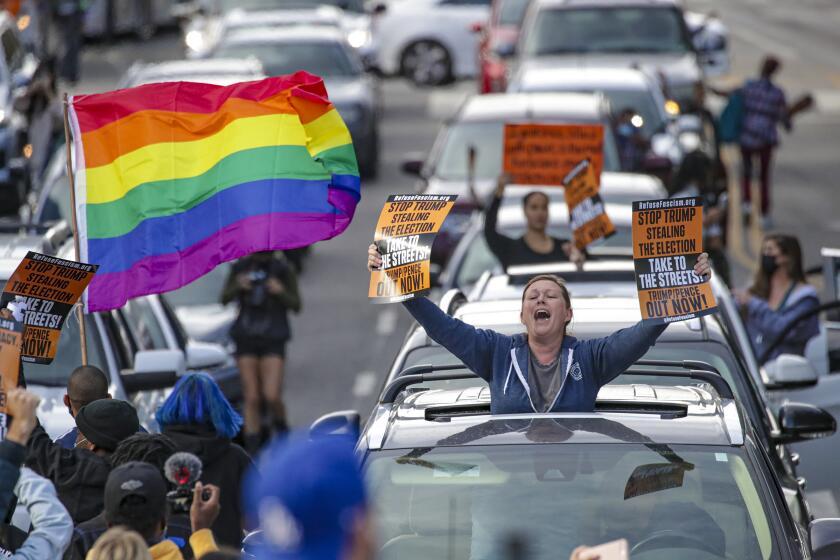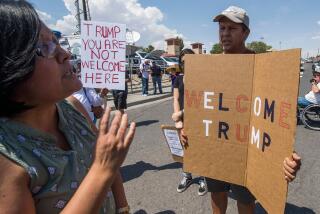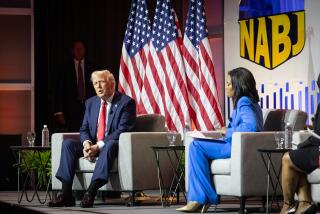Column: I set out to bridge political divides with a reader. It didn’t turn out like I expected
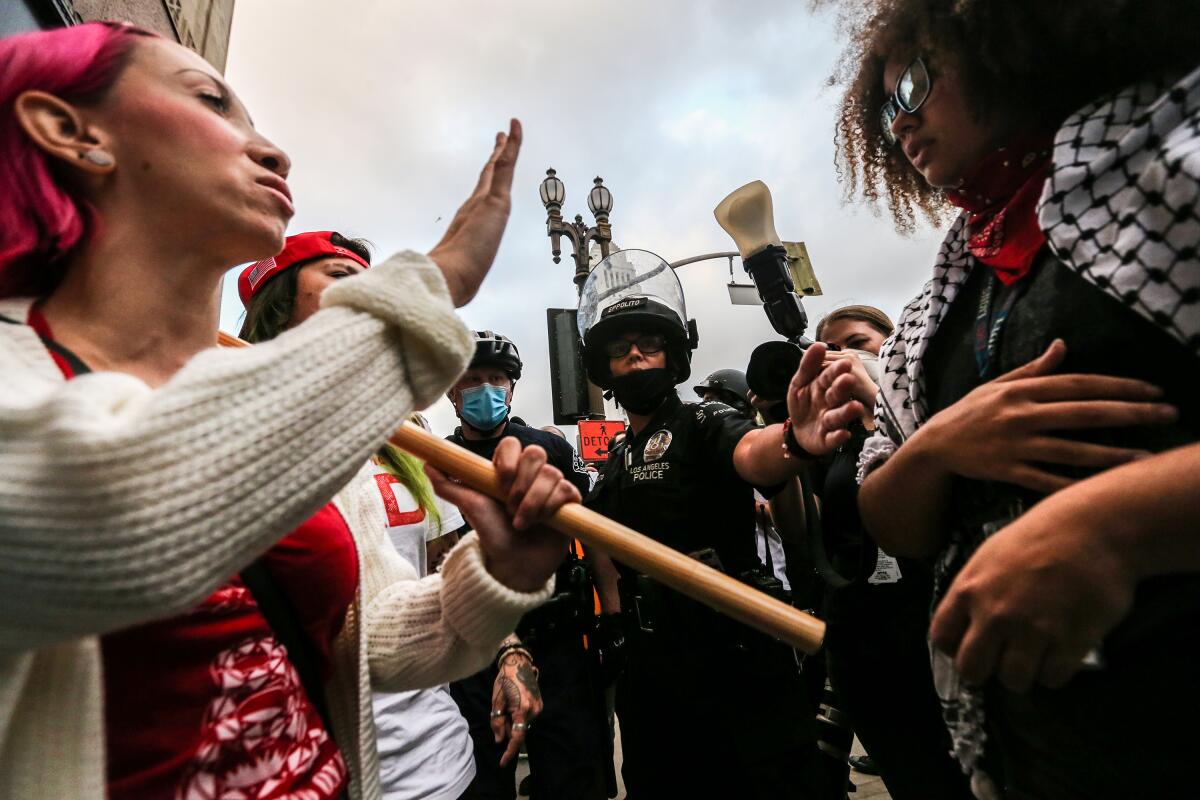
- Share via
In my last column, I wrote about my dissatisfaction with the idea of bridging divides and argued that any attempt to promote healthier dialogue across political divides needs to acknowledge the chaotic influence of social media platforms.
It was a response to our Opinion section publishing a page full of letters from Trump supporters. I was surprised, but pleased, when one of the letter writers we published wrote back to me. In an inbox often full of angry comments and responses, Mike (whose name I’m changing to protect his privacy) stood out as sincere and respectful. And here was an opportunity to engage in another time-honored journalistic tradition: trying to prove myself wrong.
I rolled up my sleeves, packed up my cynicism and turned to the task of bridging divides. A lengthy dialogue over email quickly swelled to essay-length exchanges. Finally, I called him up, and we talked for several hours.
Mike, it turned out, was not a Trump supporter but an independent who had never voted for Trump. And we agreed on much more than I expected.
Giving a full letters page to Trump voters turned the L.A. Times into a platform for propaganda, some readers said. Others appreciated it.
We both felt that the competitive condemnations of Trump and his supporters were no longer useful. We both agreed that trying to have productive exchanges over social media feels futile, like trying to have a sensitive personal conversation via billboard or lawn sign.
We both went to UCLA and studied international economics; we both followed the Lakers and both harbored a bizarre desire to see what they would have been like with Lonzo Ball and Brandon Ingram still on the squad.
Mike, who has had three other letters on the subject published in this paper, firmly believed that liberal perspectives were unfairly bleeding into what should be objective news coverage. He said liberal journalists assume that all Trump voters are white racists.
I told him I thought pure objectivity was a myth, and news coverage has always imperfectly reflected the social concerns of its time. I shared that, to me, the status quo is biased against open discussions of racism, and that the chaos of the discourse is a testament to how little we are taught about race and racism; that journalism that has uplifted minority perspectives is a necessary corrective, even if it makes white people look bad.
Our longest conversations, and our biggest disagreements, were about identity. Mike felt that people were overemphasizing identity to the point of shutting down dialogue. I told him I see identity as not something that is good, bad or voluntary but, rather, an immutable fact of how we relate to each other and see ourselves.
Mike openly admitted that the issue was personal for him. Over the summer, after a testy Facebook exchange, he fell out with a Black friend with whom he had played on the same recreational basketball team for 15 years.
Mike had just gotten one of his letters published in this newspaper and shared it on Facebook. His friend was angered by the letter and accused Mike of being a Trump supporter. When Mike said he wasn’t, his friend accessed public records that showed that the person living at Mike’s address was a registered Republican. (Mike is a registered independent, and the Republican is his roommate.)
The argument moved from the public post to private messages. After his friend accused him of not believing that Black lives matter, Mike unfriended him. Other than infrequent indirect exchanges in group text messages, they haven’t talked since.
“I felt it was important to make a stand,” Mike said. “I wasn’t saying he was wrong, but I thought what I was doing was part of positive public debate, presenting both sides.”
The man he had been seeing, also Black, was similarly disturbed by Mike’s Facebook post and concerned that Mike was a Trump supporter. After another lengthy exchange over direct messages, Mike sent him a list of 20 of his personal values in which he emphasized his belief that Black lives matter and that racism is an ongoing problem but also said that condemning people based on their politics is wrong. The conversations, Mike said, have been “painful but fruitful,” and the two are still in contact.
I was surprised to learn that Mike was a 49-year-old gay white man who was raised Catholic and came out in 2011. Disclaimer: Mike would hate that I’m describing him this way, because he doesn’t believe his gender, religion, race or sexuality should influence your opinion of him. But I thought it could help me understand who he is, so I asked him about it.
He told me about growing up with an alcoholic father and dealing with the resentment he felt toward his mother. Mike has had his own struggles with alcoholism, and after attending a support group at UCLA for the children of alcoholics, he decided to confront his mother with his feelings.
It didn’t go as planned. His mother broke into tears and apologized, and he didn’t feel any better.
“It helped me realize that there was no point in condemning her,” Mike said.
Maybe he was right and she was wrong. But forgiving her, not condemning her, is what brought him peace. And Mike has tried to apply that lesson to Trump voters, racists and anyone he disagrees with.
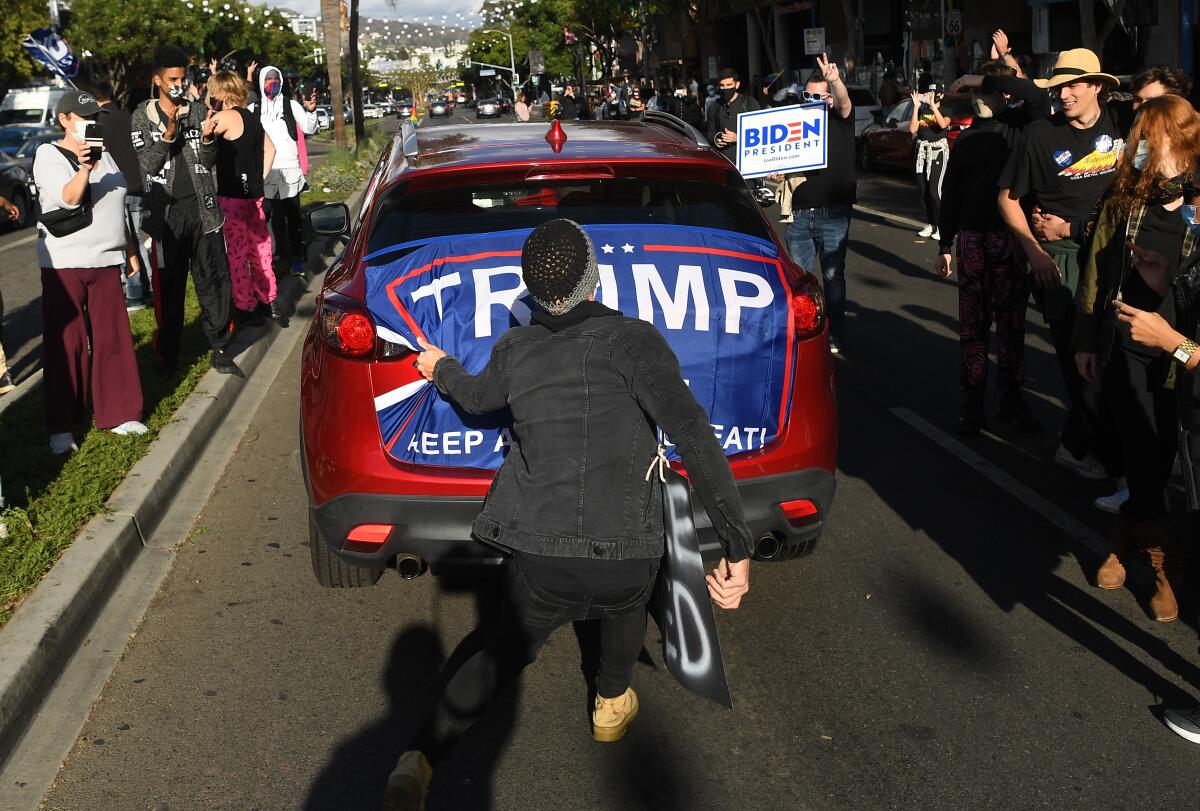
I tried to take in what he had to say. I pointed out that forgiving his mother was an act of deep, familial love, and that it’s unreasonable to expect the empathy he showed his mother in a public discourse. But ultimately, I agreed with some of what he had to say: Traumas, racial or any other kind, are better healed with love, not with condemnation.
I asked him if being closeted for most of his life had influenced his perspective about identity. Was it possible that hiding part of his identity in fear of judgment caused him to deemphasize racial and sexual identity overall?
Mike said his skeptical, contrarian tendencies are more a product of his Catholic upbringing and the spirit of inquiry that he learned from church. But he also admitted that his upbringing, his religion, his sexuality — in other words, his identity — probably shaped his perspective.
“I can identify that maybe part of that is repression and growing up in an alcoholic family,” Mike responded. “I just felt that homosexuality shouldn’t define me, and I shouldn’t be judged by that … and I reject the need to have a particular identity to hang your hat on.”
At last, we had discovered some middle ground. I can admit that a person’s race and identity don’t tell you everything, and Mike can admit that identity is not meaningless either and, in many cases, can be deeply revealing.
I asked Mike if being white and feeling condemned in racial conversations might have shaped his perspective. It made me sad to hear about his falling out with his friend, the power forward of his basketball team for so many years. I told him that talking with Black friends about race can’t just be a normal debate, and that it’s unreasonable to expect dispassionate discourse from people traumatized by endless police shootings and violence against protesters.
I told Mike that if I was his friend, what I would ask for is for him to be the bigger person: to make room for my complaints and pains, even if he felt criticized by them sometimes. If we were friends, could he make room for that?
Mike responded that he could.
At the end of the day, I didn’t have to bridge the divide myself. Mike met me in the middle, and I’m grateful for that.
More to Read
Sign up for Essential California
The most important California stories and recommendations in your inbox every morning.
You may occasionally receive promotional content from the Los Angeles Times.
